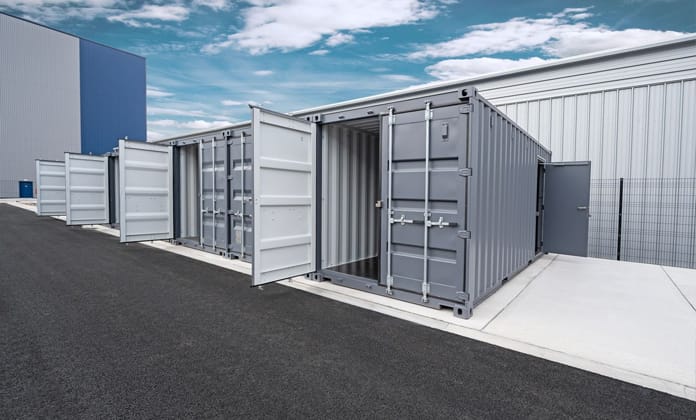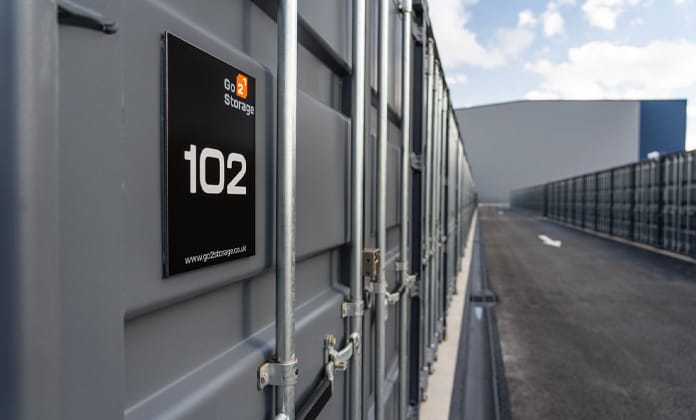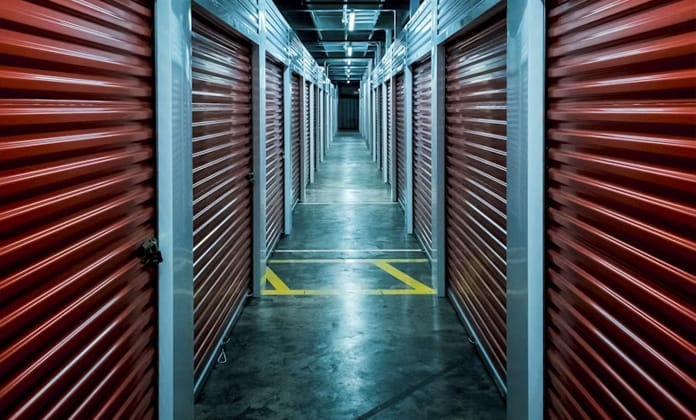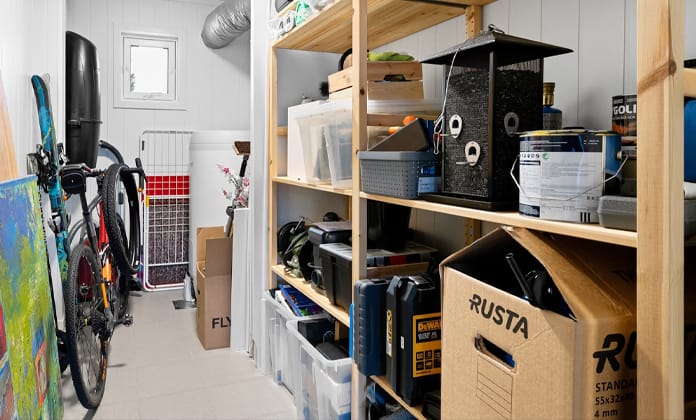Decluttering, downsizing, or simply needing some extra room? We've all been there! Finding the perfect storage solution can feel like a daunting task, especially with so many options available. From traditional self-storage units to utilising space at home, navigating the world of storage can be tricky.

Our Blog
Finding the Right Space: A Guide to On-Site, Off-Site, and Home Storage

This guide will break down three common storage types – on-site (like self-storage), off-site (such as warehouse storage), and home storage – exploring the pros and cons of each to help you make the best choice for your needs.
We understand that choosing the right storage is about more than just finding somewhere to put your stuff. It's about finding a solution that fits your budget, offers the right level of access, and gives you peace of mind knowing your belongings are safe and sound. Whether you're looking for a short-term fix during a move or a long-term storage solution, this post will equip you with the knowledge you need to make an informed decision. We'll cover everything from accessibility and cost to security and potential drawbacks, offering practical tips and advice along the way. So, let's dive in and discover the storage solution that's right for you!

1. Self-Storage Units
Self-storage offers a popular and versatile solution for a variety of storage needs. This option provides a good balance of accessibility and security, giving you control over your belongings while keeping them safely stored away. Let's explore the advantages and disadvantages:
The Pros: Why Choose Self-Storage?
- Accessibility: One of the biggest draws of self-storage is the easy access it provides. Unlike some other storage options, you can usually visit your unit whenever you need to (within the facility's access hours, of course!). This makes it ideal if you need to retrieve items regularly. Many sites such as our Go2Storage Avonmouth site are open 24 hours a day with automated entry so that you can coma and go as you need.
- Control: With self-storage, you're in charge. You manage your own unit, deciding what goes in and how it's organised. This level of control is perfect for those who like to keep a close eye on their possessions.
- Variety of Sizes: Whether you're storing a few boxes or the contents of an entire house, self-storage facilities offer a range of unit sizes to cater to different needs. This flexibility means you only pay for the space you actually require.
- Security Features: Reputable self-storage facilities like ours prioritise security, often featuring CCTV surveillance, gated access, individual unit alarms, and on-site staff. This helps to protect your belongings from theft and damage, giving you peace of mind.
- Short-Term or Long-Term Options: Need storage for just a few weeks during a house move? Or perhaps you require a long-term solution for excess furniture? Self-storage offers flexible rental agreements, allowing you to choose a term that suits your circumstances.
The Cons: Things to Consider
- Cost: Self-storage can be a significant expense, especially in high-demand areas. The cost will vary depending on the size of the unit, its location, and the length of your rental period. It's essential to get quotes from different facilities before making a decision.
- Access Hours: While our self-storage facilities offer extended access hours, some may have restrictions. If you need 24/7 access, be sure to check the facility's operating hours before you sign up.
- Potential for Damage: While generally secure, self-storage units can be susceptible to damage if not properly maintained. Damp, pests, and extreme temperatures can all pose a threat to your belongings. Choose a reputable facility that prioritises cleanliness and offers ventilated units if necessary. Properly packing and storing your items is also crucial.
- Travel Time to Access Unit: Depending on the location of the self-storage facility, travelling to and from your unit can take time. Factor in the travel time when considering self-storage, especially if you anticipate needing frequent access to your belongings.

2. Warehouse Storage
Off-site storage, often in the form of warehouse storage, provides a different approach to storing your belongings. This option typically involves storing your items in a larger, shared warehouse space managed by a storage company. While it might not offer the same level of direct access as self-storage, it can be a cost-effective solution for certain needs. Let's weigh up the pros and cons:
The Pros: Advantages of Warehouse Storage
- Potentially Cheaper for Large Volumes: For those with a substantial amount of items to store, warehouse storage can be more economical than individual self-storage units. Since you're sharing space within a larger facility, the per-item cost can be lower, especially for bulk storage needs.
- Professional Handling and Management of Goods: Off-site storage providers often offer professional handling and management of your goods. This can include services like inventory management, packing, and even transportation. This is particularly beneficial for businesses or individuals with large quantities of items or those requiring specialised handling.
- Suitable for Businesses with Bulk Storage Needs: Warehouse storage is often a popular choice for businesses that need to store excess stock, equipment, or archives. The scale and logistical capabilities of warehouse storage providers make them well-suited for large-scale storage requirements.
The Cons: Drawbacks of Warehouse Storage
- Less Direct Access: One of the main drawbacks of off-site storage is limited direct access to your belongings. Unlike self-storage, you usually can't just pop in whenever you need something. Access typically requires booking an appointment in advance, which can be inconvenient if you need something urgently.
- Less Control: With warehouse storage, you have less direct control over your stored items. You are relying on the storage provider to manage your goods, which may not suit everyone. Clear communication and a detailed inventory are essential to ensure your items are properly handled.
- Potential for Higher Costs for Smaller Quantities: While cost-effective for large volumes, warehouse storage can actually be more expensive than self-storage for smaller quantities of items. Many providers have minimum storage requirements or charge handling fees that can make it less economical for smaller storage needs.
- Less Flexibility: Off-site storage often involves less flexibility than self-storage. Rental agreements may be longer, and accessing your belongings might require more notice. This lack of flexibility can be a problem if your storage needs change unexpectedly.

3. Home Storage
Many of us look to the spaces within our own homes for extra storage. Lofts, garages, and sheds often become the dumping ground for everything from Christmas decorations to old furniture. While seemingly convenient, home storage has its own set of advantages and disadvantages to consider.
The Pros: The Appeal of Storing at Home
- Convenient Access: The biggest advantage of home storage is undoubtedly the sheer convenience. Your belongings are readily available whenever you need them, just a trip to the loft, garage, or shed away. This can be a huge time-saver compared to travelling to an off-site storage facility.
- No Monthly Fees: Unlike self-storage or warehouse options, storing items at home usually doesn't involve any recurring monthly fees. This can make it a very attractive option for those on a tight budget. Of course, there might be initial costs associated with setting up the storage space, like shelving or containers.
- Can Be Customised to Your Needs: With home storage, you have the opportunity to customise the space to perfectly suit your needs. You can add shelving, install hanging racks, or organise items in a way that makes sense to you. This level of customisation can be particularly useful for storing oddly shaped or bulky items.
The Cons: The Challenges of Home Storage
- Limited Space: One of the main limitations of home storage is the finite amount of space available. Lofts, garages, and sheds can quickly become overcrowded and cluttered, making it difficult to find what you're looking for. If you're not careful, your storage space can actually end up adding to your stress rather than alleviating it.
- Environmental Factors: Lofts, garages, and sheds are often exposed to extreme temperatures, dampness, and pests. These environmental factors can damage your stored belongings, especially sensitive items like electronics, documents, or furniture. It's crucial to consider the potential for damage and take steps to protect your items, such as using airtight containers and controlling humidity.
- Security Concerns: Home storage areas can be vulnerable to theft. Garages and sheds, in particular, can be easy targets for burglars. It's important to invest in good quality locks and security measures to protect your belongings from theft.
- Can Impact Living Space: Storing too much stuff at home can encroach on your living space, making your home feel cramped and cluttered. This can have a negative impact on your overall well-being. It's important to strike a balance between storing what you need and maintaining a comfortable living environment.
Choosing the right storage solution is a crucial decision, impacting everything from your budget and accessibility needs to the safety and security of your belongings. As we've explored, each option – self-storage, warehouse storage, and home storage – offers a unique set of advantages and disadvantages. Self-storage provides excellent access and control, while warehouse storage can be more economical for large volumes. Home storage offers convenience but comes with potential environmental and security risks.
Ultimately, the best storage solution for you will depend on your individual circumstances. Consider what you need to store, how often you'll need access to it, your budget, and your priorities regarding security and environmental protection. Don't rush the decision. Take the time to weigh the pros and cons of each option carefully. Research local facilities, compare prices, and ask questions. By carefully considering your needs and exploring the available options, you can find the perfect storage solution that gives you peace of mind and frees up valuable space in your life.